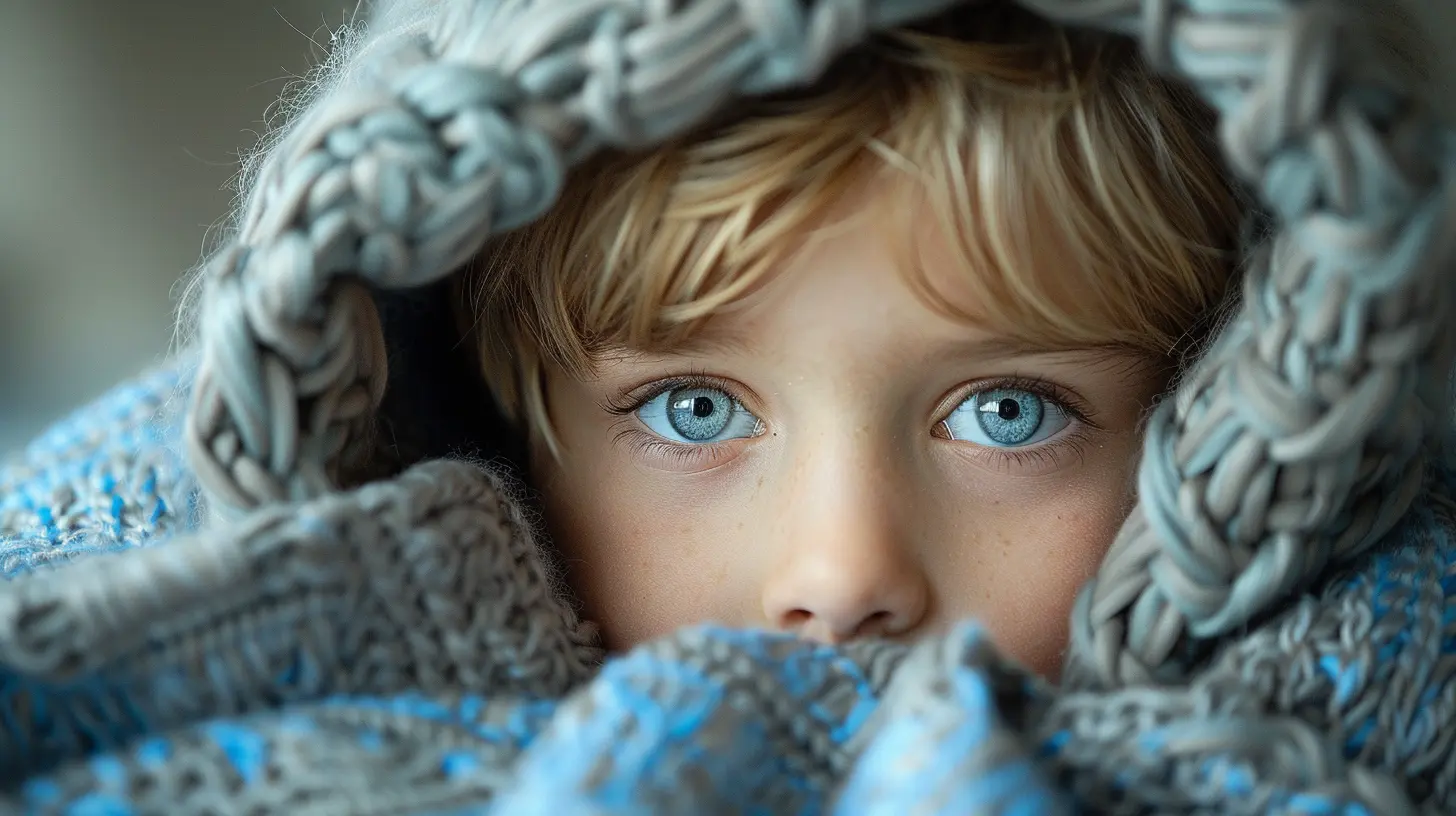19 December 2024
Let’s face it—kids can be walking question marks. They have curious little minds constantly trying to make sense of the world, and sometimes, that can lead to fears. One big one that's been popping up more frequently, especially in these uncertain times, is the fear of getting sick. Maybe your child panics the moment someone sneezes in public or becomes hyper-aware of germs. Sound familiar? Don’t worry, you're not alone in dealing with this.
If your child has developed a fear of getting sick, you might be wondering what’s the best way to deal with it. The last thing you want is for this fear to hinder their day-to-day activities or grow into something more challenging later on. In this article, we'll go over why kids develop this fear, how it might manifest, and practical steps you can take to help ease their worries.
Why Some Children Develop a Fear of Getting Sick
Before diving into tips and solutions, it’s important to understand why your child may be afraid of getting sick. Fear is part of human nature—but when it becomes extreme or irrational, it can be overwhelming for kids.1. Overexposure to Information
Today’s kids have more access to information than ever before. From news reports to social media mentions, they may be absorbing a lot of info about illnesses, viruses, and health risks. Over the last few years, with global health events like the pandemic, children may have been hit with a constant stream of information about how dangerous getting sick can be.For a child, that can create a sense of anxiety—especially when they don’t fully understand the complexities.
2. Personal Experiences
Maybe they’ve had a bad experience with illness in the past. A rough bout with the flu, a trip to the hospital, or even seeing a loved one fall severely ill can leave a lasting impact. It could be that these personal experiences are triggering their fear of getting sick.3. Parental Influence
Like it or not, children often mirror their parents. If you, as a parent, are overly cautious about germs or constantly stressed about health matters, this may ripple down to your child. Children are like sponges—they pick up on more than we realize, and your behaviors around illness may be amplifying their fears.4. School Environment
Schools can be breeding grounds for the spread of illness, and many schools have strict policies around staying home when feeling unwell. They might hear their teachers or peers constantly talk about getting sick, and this could elevate their anxiety levels. What starts as a concern can spiral into fear with ongoing exposure to the topic.
Recognizing the Signs: How Do You Know If Your Child Is Afraid of Getting Sick?
Fears can manifest differently for each child. Some might express their worries directly, while others show more subtle behavioral hints. Here’s how you can identify if your child is battling a fear of illness:1. Avoidance Behaviors
Is your child avoiding places where they think germs might be shared? For example, do they try to dodge school, playdates, or even family gatherings because they’re afraid of catching something? Avoidance is a clear sign that their fear is affecting their daily life.2. Excessive Handwashing or Hygiene Practices
A fear of germs could lead to obsessive behavior around cleanliness. If your child is washing hands non-stop, using hand sanitizer excessively, or is becoming panicked if someone around them sneezes, these could indicate a fear of illness.3. Asking Constant Questions About Health and Sickness
Kids naturally ask questions—that’s totally normal. However, if your child keeps asking about illnesses, symptoms, or how to stay healthy (“Will I get sick if I do this?”), they may be hyper-focusing on the idea of getting sick.4. Trouble Sleeping or Complaints of Physical Symptoms
Anxiety can often show itself through physical symptoms. A child might complain of stomach aches, headaches, or trouble sleeping because they’re worried about getting sick. Sometimes, there’s no actual illness—just anxiety manifesting physically.5. Overreaction to Minor Sickness
Has your child become overly dramatic about minor symptoms? A slight cough or sniffle might send them into a panic, fearing that they’ve come down with something much worse.
Practical Tips: How to Help Your Child Overcome Their Fear of Getting Sick
Now that we’ve covered the "why" and the "how" of your child’s fear, what can you do to help? Here are some tried-and-true strategies to ease their anxiety and help them cope more effectively.1. Open Up a Healthy Dialogue
The first step is to talk about their fear. Sometimes, just acknowledging it in an empathetic and understanding way can make a world of difference. You could say something like, “I see you're worried about getting sick. Can you tell me what exactly makes you scared?”Encouraging them to talk about what’s bothering them can help you better understand the root of the fear. But don’t stop there. Be prepared to discuss it openly—and frequently. Kids need reassurance, and talking it out can help diminish some of their anxiety over time.
Also, avoid dismissing their fears. Saying “Oh, don’t be silly” won’t help. What feels trivial to you may be monumental to them, and they need to feel validated.
2. Educate Without Overwhelming
Knowledge is power, right? Well, sometimes too much knowledge can add to the fear. While it’s important to educate your child about staying healthy, be mindful of how much information you’re feeding them.Take this opportunity to explain the difference between minor illnesses and serious ones. Let them know that getting a cold or feeling under the weather every now and then is completely normal and actually helps their immune system get stronger over time.
You could also walk them through what happens if they do get sick: rest, fluids, maybe a visit to the doctor—and then they’ll be back to normal. Take the mystery out of it for them.
3. Model Calm, Healthy Habits
Remember when I mentioned how children tend to mirror us? This is a prime opportunity to model calm and effective habits when it comes to health. Show them how you manage germs in realistic and stress-free ways. You wash your hands when necessary, eat nutritious meals, and practice good hygiene, but you don’t obsess over it.When they see you taking a balanced, rational approach to health, they’re more likely to follow suit.
4. Introduce Relaxation Techniques
If your child’s fear of sickness is triggering significant anxiety, teaching them relaxation techniques can be a lifesaver. Simple things like deep breathing exercises, visualization, or even mindfulness practices can help them stay calm when their anxieties flare up.You can create a “calm down” routine that they can turn to when they start feeling overwhelmed. For instance, have them sit in a quiet space, breathe slowly, and focus on something comforting. Over time, this can significantly reduce their overall stress.
5. Limit Exposure to Worry-Inducing Media
If your child is constantly getting bombarded with news reports about viruses, diseases, and sickness, it might be time to pull back on their media consumption. Kids are impressionable, and sometimes what they hear or read can stick with them for longer than we realize.Monitor the kind of information they’re absorbing and make gentle adjustments where needed. This doesn’t mean sheltering them completely; it’s about finding a healthy balance so that they aren’t overwhelmed with worst-case scenarios.
6. Gradual Desensitization
If your child has started avoiding specific situations out of fear, consider using gradual desensitization. This technique involves slowly exposing them to the things they fear in a controlled, safe way. For example, if your child is scared of going to the park because of potential germs, gradually introduce short visits where you reassure them about how to stay healthy.Initially, it might involve simply talking about the park without going or doing a walk-by. The key is taking small steps that allow your child to feel more in control rather than forcing them into a situation they’re not ready to handle.
7. Celebrate Bravery
When you notice your child making progress, celebrate it! If they manage to calmly deal with a friend coughing around them or handle their minor cold without freaking out, make sure to tell them how proud you are of their bravery.These little victories will build their confidence and reduce their fear over time. Positive reinforcement goes a long way in helping them feel empowered about facing their fears.
When Should You Seek Professional Help?
While many kids are able to overcome their fear of getting sick with guidance and support, there are cases where professional help may be necessary. If your child’s fear is significantly interfering with their life—stopping them from going to school, playing with friends, or causing extreme distress—then it might be time to consult a therapist. Cognitive-behavioral therapy (CBT), in particular, can be a powerful tool to help children manage their anxiety in a structured way.Never feel afraid to reach out for help. The earlier you address anxiety, the easier it is to help your child develop the tools to manage it in a healthy way.
Final Thoughts
Helping a child who fears getting sick isn’t always easy, but with the right approach, patience, and support, you can guide them toward a healthier mindset. Remember, you are their biggest role model, and demonstrating calm and rational behavior around sickness will go a long way in helping them face their fears.By keeping the conversation open, providing reassurance, and teaching practical coping strategies, you’ll give your child the tools they need to put their worry in check. And soon, they’ll be tackling those fears head-on!









Faye Mitchell
Addressing your child's fear of sickness requires empathy and open communication. Encourage them to express their feelings while fostering a sense of safety.
March 7, 2025 at 4:28 PM